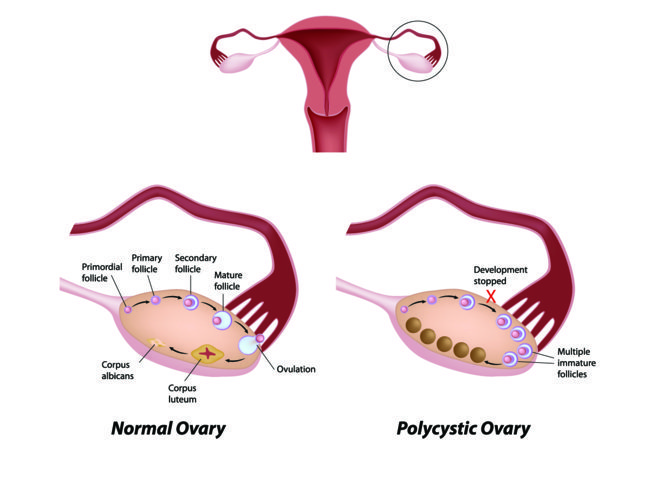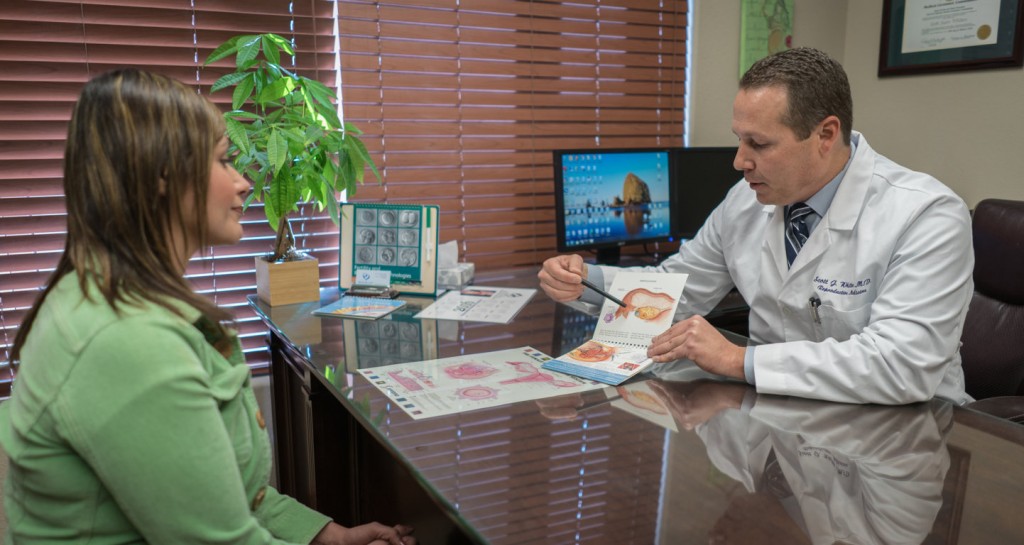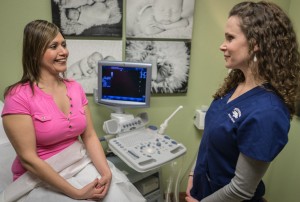What Is PCOS?
Polycystic ovarian syndrome affects approximately 5 million women in the United States, or about 4% of all reproductive-aged women. It is the most common hormone disorder in reproductive-aged women and is the leading cause of female infertility.
It is one of the most treatable forms of infertility, yet patients often suffer from it too long because it is unrecognized or mistreated. Many patients are surprised to find that there are effective treatments available for virtually every symptom associated with the condition.
PCOS was first described by Drs. Stein and Leventhal in 1935 as a disease characterized by amenorrhea (no menses), hirsutism (i.e., excessive body hair growth), obesity and the presence of polycystic ovaries. The condition was subsequently referred to as “polycystic ovary syndrome” because the polycystic ovary was a distinguishing characteristic. It could have also easily been called the “amenorrhea, hirsutism syndrome” since these are the clinically important features, but PCOS became the standard.

The polycystic ovary contains many small cysts, 2 – 6 mm in diameter. In the past, it was diagnosed during surgery when the ovary could be seen. Now, an ultrasound examination can reveal the polycystic nature of an ovary. Since using ultrasound, polycystic ovaries have been observed in 25% of normal women. Hence, it is important to distinguish the findings of polycystic ovaries and PCOS.
Polycystic ovaries are a common finding in patients with PCOS, but do not define the condition. For example, a running nose is a common finding of a cold, but does not mean that a person with a running nose has a cold. Other conditions can cause one’s nose to run, such as allergies, sniffing pepper, crying, etc. An individual with a cold can present with a multitude of symptoms. Women with PCOS also present with a variety of symptoms. Polycystic ovaries are merely one feature of the polycystic ovarian syndrome.
PCOS is a clinical diagnosis based on irregular ovulation and signs of excessive androgen (male-type hormones) effect. It is called a syndrome because it represents a constellation of clinical symptoms. The diagnosis cannot be established by a single symptom or clinical test alone. Individuals will present with an extreme variety of manifestations.
The spectrum may range from a thin woman with occasionally skipped menses to an overweight woman with no menses who suffers from hirsutism acne, diabetes, balding, skin pigmentation and the inability to lose weight no matter how many diets she follows. Table 1 lists the most frequent features of the condition.
Symptoms Of PCOS
| Clinical Features of PCOS | Incidence |
| Irregular menses | 85% |
| Hirsutism | 70% |
| Obesity | 40% |
| Acne | 35% |
| Skin pigmentation | 3% |
Irregular menses is a hallmark for an individual who does not ovulate regularly. Since the lack of ovulation is a central feature of the syndrome, many patients will suffer from infertility. Due to the heterogeneity of the syndrome, guidelines have been established to diagnose the condition. In the United States, we diagnose the condition when a patient has irregular menses and symptoms of hyperandrogenemia, such as hirsutism, acne and/or oily skin.
What Causes PCOS?
The syndrome is a result of a functional hormonal disorder that disrupts normal ovarian function. It is best thought of as an imbalance of hormones that control the ovary’s ability to mature and release an egg.

Normally, the pituitary gland in the center of the brain releases follicle stimulating hormone (FSH) which travels through the blood stream to the ovaries telling them to mature or “grow” an egg. An ovary complies by stimulating a follicle’s growth. A follicle is a cyst containing an egg and many “nursing” granulosa cells.
The follicle begins as a small cyst less than 2 – 6 mm in diameter. As it matures, the follicle fills with fluid until it measures over 20 mm in diameter. This takes approximately 14 days. This time frame is called the follicular phase of the menstrual cycle. Once mature, the follicle sends back a signal to the brain indicating it is ready for ovulation. The pituitary gland then sends out a pulse of luteinizing hormone (LH), telling the ovary to release or ovulate the egg.
The follicle ruptures (i.e., the cyst pops) releasing the egg to the surface of the ovary where the fallopian tube should pick it up. PCOS occurs when the hormonal signals are not carried through. Thus, follicles do not grow and release the egg, but instead stay small 2 – 6 mm in diameter each month. Over time, these small follicles build up resulting in an ovary packed with multiple small cysts.
The reason why the ovary fails to respond to the FSH is not well understood. It is believed that there are elevated “resistance factors” that inhibit the ovaries ability to function normally. Some of these resistance factors are the androgens and insulin-like growth factors. These hormones raise the threshold at which the ovary will respond to FSH. If the FSH does not reach that threshold, the follicles become stalled in the early part of growth. The ovary stays in a steady-state of no ovulation which is the hallmark of PCOS.
These resistance factors are manifested in other areas of the body. Androgens in the skin cause hirsutism or male-type distribution of hair growth on the face, chest and abdomen. Increased activity in the oil gland of the hair follicle may also result in oily skin and acne.
Nearly 70% of patients with PCOS have some degree of insulin resistance. Insulin is a hormone released into the blood stream by the pancreas. It works to drive blood glucose into cells. Insulin resistance means that more insulin is needed to achieve the same result as a person without PCOS. Patients with type II diabetes have the same condition. Indeed, PCOS patients are at a higher risk of developing type II diabetes.
The reason for this insulin resistance is an intense area of research. Currently, it is believed to be related to an inherent defect within the cells signaling mechanism to allow glucose to come into the cell. Due to the cellular resistance, PCOS patients have elevated levels of insulin and/or insulin-like growth factors which can then adversely affect the ovary. In addition, insulin promotes growth or body mass/weight retention. Because of this, PCOS patients have a very difficult time losing weight regardless of how much they exercise and diet.
Excess body weight and obesity are commonly known stimulants to both elevated androgen levels and insulin resistance. Since insulin resistance results in elevated insulin levels which then promote further weight gain, an overweight individual becomes trapped in a viscious cycle. The more weight she gains, the worse the condition becomes. All the symptoms of PCOS, including hirsutism, anovulation and difficulty losing weight become more difficult to reverse. Consequently, excess weight can exacerbate PCOS and in some individuals can even be the sole cause of the condition.
How Is PCOS Treated?

Generally, the therapeutic options are directed at one or more of the following: 1) Restoring normal menstrual cycles 2) Reducing symptoms of excess hair growth or oily skin 3) Restoring normal fertility 4) Weight reduction.
Oral contraceptive pills (OCPs) are the most effective method to correct # 1 and improve # 2. Naturally, they are counterproductive for both # 3 and # 4. OCPs contain estrogen and progesterone. These are the hormones produced by the ovary that govern the normal menstrual cycle. Futhermore, estrogen acts as an antagonist to androgen effects seen in PCOS.
There are several agents available to effectively treat # 2. Besides OCPs, a common anti-androgen is the diuretic, spironolactone. Others include finasteride, flutamide and cyproterone acetate. Since hair growth and turnover occur over a long time, the results of decreasing hirsutism with these agents sometimes takes 3 – 6 months to appreciate an effect.
Restoring fertility (# 3) requires returning the FSH effect to a predominant role on the ovary. This can be achieved by either reducing the “resistance factors” or merely increasing the FSH until it reaches the elevated threshold required for follicles to grow. Insulin sensitizing agents are the most effective for reducing insulin resistance. These include metformin, rosiglitazone and D-chiroinositol (not yet commercially available). These agents are very effective adjuncts for treating # 4. By reducing insulin levels, the weight promoting stimulus is reduced and the patient finds it easier to lose weight through diet control and exercise.

Both the androgens and insulin-like growth factors are produced by cells in the center of the ovary. Therefore, destructive and suppressive treatments are available to reduce these cells. Drs. Stein and Leventhal described the “ovarian wedge resection” as a treatment for PCOS. This surgery removed a section of the ovary in an effort to debulk the resistance-factor producing cells of the ovary.
Currently, this has been replaced by laparoscopic ovarian drilling. Because it is invasive and could potentially cause adhesion which could compromise fertility, surgery is a measure of last resort for the treatment of PCOS. The drug, Lupron, is the most effective suppressor of ovarian activity. It also is considered a measure of last resort since it is very expensive and associated with many side-effects.
Two types of fertility drugs exist capable of increasing the FSH level. Clomiphene citrate is the most commonly used. It works by stimulating the pituitary release of FSH. Gonadotropins are the other class of fertility drugs. They are merely purified forms of FSH. The dose of these injectable medications can be adjusted until the threshold is reached causing follicle growth. Often, we use a combination of the above medications to optimize follicular growth to restore fertility.
Every patient with PCOS can be treated effectively. Because the symptoms are so diverse, no single treatment fits all conditions. It is essential to recognize the syndrome, determine the desired treatment goals and develop an appropriate treatment plan to achieve those goals.
We Will Overcome Infertility Together! Call Us At (775) 828-1200, Or
CLICK HERE To Contact Us Online.
Start Your Journey Today!


